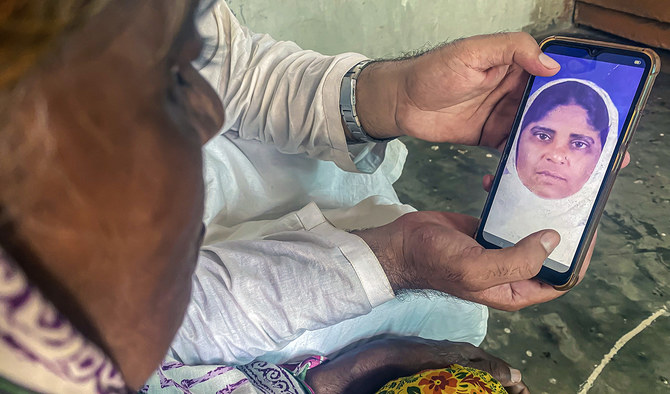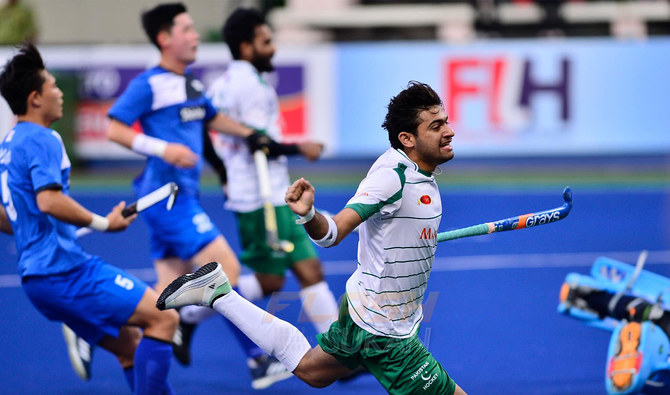KARACHI: An Indian woman who was trafficked to Pakistan two decades ago said on Thursday she was eagerly waiting to return to her country after a video call arranged by a local cleric last week allowed her to see her children for the first time in two decades.
South Asia, with India at its center, is the fastest-growing and second-largest region for human trafficking in the world, after East Asia, according to the United Nations Office for Drugs and Crime.
In 2020, a total of 4,966 cases of human trafficking were registered from across India. In 2019, the government reported 2,088 trafficking cases under the Indian Penal Code, compared with 1,830 trafficking cases in 2018, according to data from the US State Department.
Hammida Banu Shaik was trafficked in 2002 after an employment agency offered her a job in Dubai. The woman had already spent nine years working in Doha in the 1990s and did not suspect that the job offer was part of a plot to kidnap and traffic her. She ultimately ended up in Pakistan where she was kept in illegal confinement in Hyderabad city. After three months, however, she managed to escape through a window and fled to Karachi where she has been living since. Arab News has reviewed proof of Shaik’s employment in the Middle East and her Indian nationality.
"[Before I left India] my younger son told me, 'Don't worry about my marriage, I will earn and take care of you'," Shaik told Arab News. "'I will work hard at the railway station. Don’t go.'"
But Shaik left to pursue what she thought was another job that would help to support her poor family and it was only this week, after twenty years, that the 65-year-old had her first contact with her children since her kidnapping.
“I met my grandchildren for the first time [online],” Shaik said. “I wanted to hold them and give them all my love. I wish there was a way I could have flown to them.”
The virtual meeting came about when a local prayer leader and social activist, Waliullah Maroof, interviewed Shaik on YouTube and the video was picked up by a Mumbai-based journalist, Khalfan Shaikh, who contacted Maroof and published a story about the woman's ordeal online. Last Sunday, the journalist contacted Maroof again, saying Shaik’s children had recognized her from the online posts. The cleric arranged a video call the same evening.
“I had lost all hope, thinking I was going to die in Pakistan without meeting my children,” she said.
Speaking about her years in Pakistan, Shaik said soon after arriving in Karachi, she realized it would be difficult for her to survive without a man since people were not even willing to rent her a room in the absence of a male family member.
“I used to say what kind of law you have in Pakistan,” she said. “Does the law here prohibit people from renting out space to a woman who is all by herself?”
Shaik thus decided to marry a Pakistani man who she said took care of her as long as he lived and also agreed to help her look for her family in India and send her to meet them, but under one condition: that she promise to return to Pakistan.
Shaik never made the promise and her husband hence never let her travel to India.
Saving small change for years, the woman said at one point she had Rs2,000, which she tried to use to contact her children via telephone. But she always reached a wrong number.
"'Are you mad? The number on which you are calling is not of your children, your children are not here,'" Shaikh said, quoting the person on the other end of the receiver. "The person who would pick up the phone was not my own."
And so, she kept dreaming of meeting her children and never went a day without praying for their wellbeing.
Now, finally, her prayers have been answered.
“I forgot all my hardships, though even today I cannot eat, drink or sleep [out of happiness],” she said. "I had left them when they were small kids. Today I have met such grown up children that I couldn't recognize them."
Shaikh said she has been contacted by the Indian high commission in Islamabad, which had requested her to send a formal application to travel to India. She has dispatched the documents.
“I want to go to India to spend the rest of my life with my family,” she said. "I request India to send me to my children at the soonest. I need nothing else."
The Indian high commission did not respond to phone calls seeking comment.
















